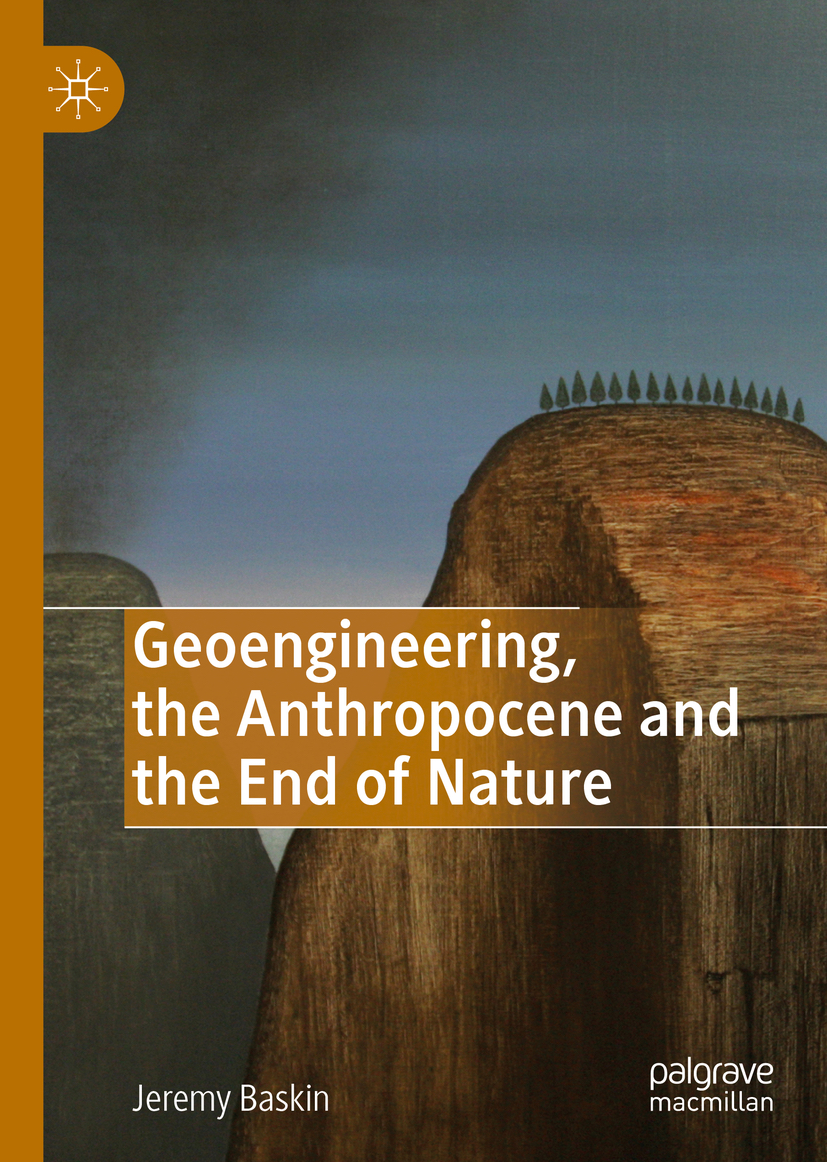
Geoengineering, the Anthropocene and the End of Nature
Jeremy Baskin
Palgrave 2019
This book takes a critical look at solar geoengineering as an acceptable means for addressing climate change. Baskin explores the assumptions and imaginaries which animate ‘engineering the climate’ and discusses why this climate solution is so controversial. The book explains geoengineering’s past, its revival in the mid-2000s, and its future prospects including its shadow presence in the Paris climate accord. The main focus however is on dissecting solar geoengineering today – its rationales, underpinning knowledge, relationship to power, and the stance towards nature which accompanies it. Baskin explores three competing imaginaries associated with geoengineering: an Imperial imaginary, an oppositional Un-Natural imaginary, and a conspiratorial Chemtrail imaginary. He seeks to explain why solar geoengineering has struggled to gain approval and why resistance to it persists, despite the support of several powerful actors. He provocatively suggests that reconceptualising our present as the Anthropocene might unwittingly facilitate the normalisation of geoengineering by providing a sustaining socio-technical imaginary.
More information is available here.
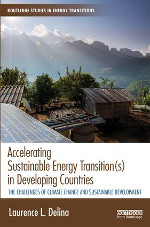
Accelerating Sustainable Energy Transition(s) in Developing Countries: The challenges of climate change and sustainable development
Laurence Delina
Routledge, 2018
Accelerating sustainable energy transitions away from carbon-based fuel sources needs to be high on the agendas of developing countries. This book explores how the transitions occur in fourteen developing countries and broadly surveys their technological, policy, financing, and institutional capacities in response to the three key aspects of energy transitions: achieving universal energy access, harvesting energy efficiency, and deploying renewable energy. The book shows how fragmented these approaches are, how they occur across multiple levels of governance, and how policy, financing, and institutional turns could occur in these complex settings.
More information is available here.

Bioeconomies Life, Technology, and Capital in the 21st Century
Vincenzo Pavone, Joanna Goven
Palgrave, 2017
This book explores the promissory discourses and practices associated with the bioeconomy, focusing especially on the transformation of institutions; the creation, appropriation, and distribution of value; the struggle over resources, power, and meaning; and the role of altruism, kinship, and care practices. Governments and science enthusiasts worldwide are embracing the bioeconomy, championing it as the key to health, wealth, and sustainability, while citing it as justification to transform research and regulatory institutions, health and agricultural practices, ethics of privacy and ownership, and conceptions of self and kin. Drawing together studies from Asia, Australia, the Americas, and Europe, this volume encompasses subjects as diverse as regenerative medicine, population health research, agricultural finance, biobanking, assisted reproduction, and immigration.
More information is available here.
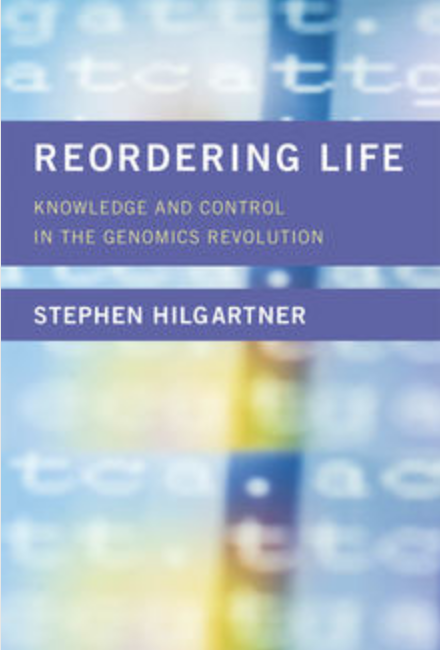
Reordering Life: Knowledge and Control in the Genomics Revolution
Stephen Hilgartner
MIT 2017
The rise of genomics engendered intense struggle over the control of knowledge. In Reordering Life, Stephen Hilgartner examines the “genomics revolution” and develops a novel approach to studying the dynamics of change in knowledge and control. Hilgartner focuses on the Human Genome Project (HGP)—the symbolic and scientific centerpiece of the emerging field—showing how problems of governance arose in concert with new knowledge and technology. Using a theoretical framework that analyzes “knowledge control regimes,” Hilgartner investigates change in how control was secured, contested, allocated, resisted, justified, and reshaped as biological knowledge was transformed. Beyond illuminating genomics, Reordering Life sheds new light on broader issues about secrecy and openness in science, data access and ownership, and the politics of research communities.
More information is available here.

Structure, Agency and Biotechnology: The Case of the Rothamsted GM Wheat Trials
Aristeidis Panagiotou
Anthem Press 2017
The overarching aim of “Structure, Agency, Biotechnology: The Case of the Rothamsted GM Wheat Trials” is to propose a way of filling the analytical gap found in the current literature by offering an original theoretical framework. This framework is able to assess both the content and context of the scientific field without resorting either to deterministic or to what theorists refer to as “conflationist strategies.” In order to demonstrate the heuristic value of the framework, the 2012 GM wheat field trials carried out by Rothamsted Research, often associated with the “second push” of agribiotech firms to bring Genetically Modified Organisms (GMOs) to the UK, are assessed, and key aspects of the experiment are underscored. At the same time, the broader institutional arrangements, key ideological constructs and the social order are examined, and a reframing of the controversy which moves beyond the simplistic conceptualization of it being a case of science versus politics is suggested.
More information is available here.
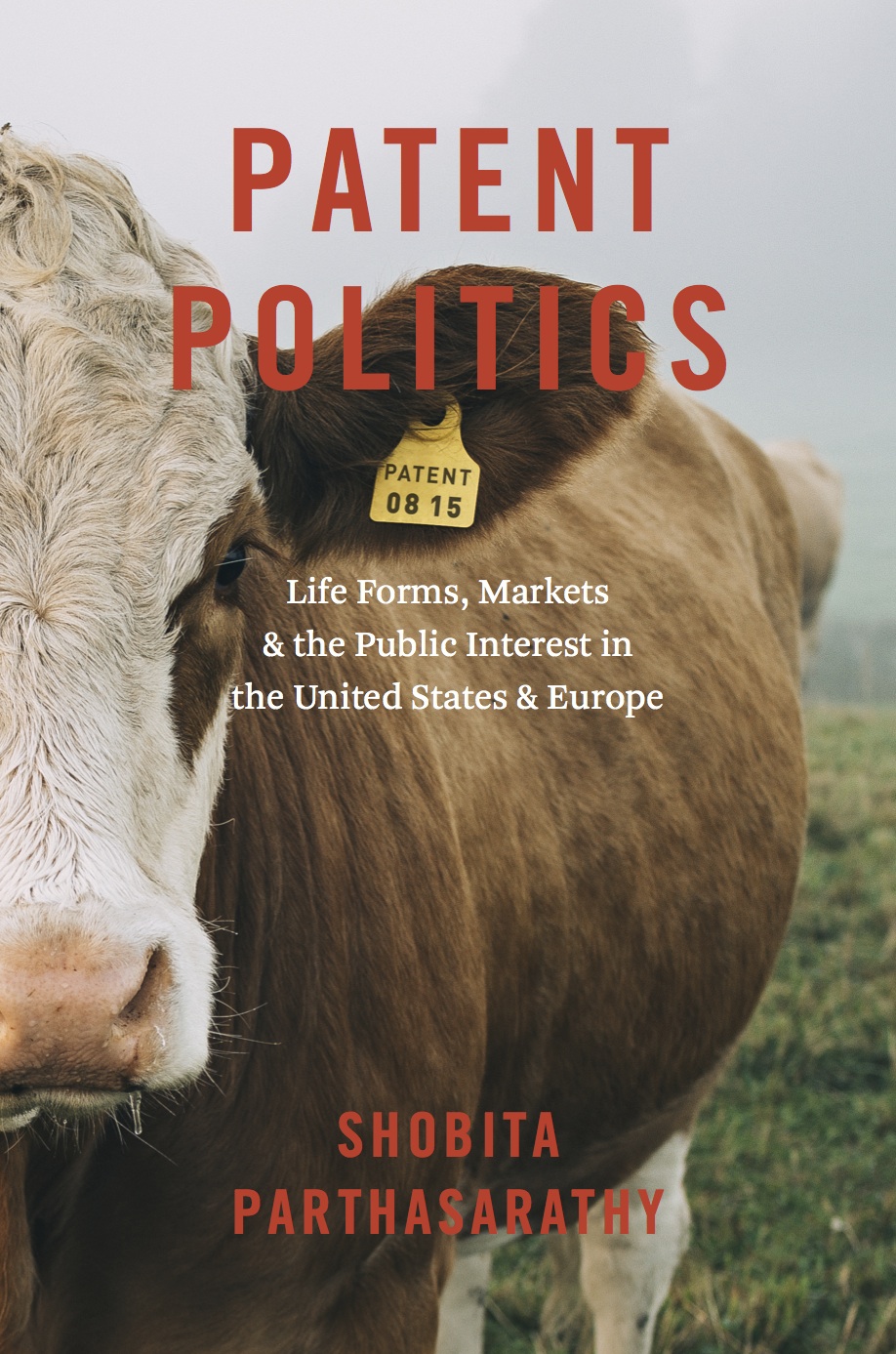
Patent Politics: Life Forms, Markets, and the Public Interest in the United States and Europe
Shobita Parthasarathy
University of Chicago Press, 2017
Over the past thirty years, the world’s patent systems have experienced pressure from civil society like never before. From farmers to patient advocates, new voices are arguing that patents impact public health, economic inequality, morality—and democracy. These challenges, to domains that we usually consider technical and legal, may seem surprising. But in Patent Politics, Shobita Parthasarathy argues that patent systems have always been deeply political and social.
More information is available here.

The Practices of Global Ethics
Frederick Bird, Sumner B. Twiss, Kusumita Pedersen, Clark A. Miller, and Grelle Bruce
Edinburgh University Press, 2016
The Practices of Global Ethics takes a unique look at global ethics: not as mere written statements but as a set of practices undertaken by thousands of organisations and hundreds of thousands of people to shape the normative trajectory of human affairs.
More information is available here.

Science and Democracy: Making Knowledge and Making Power in the Biosciences and Beyond
Edited by Stephen Hilgartner, Clark Miller and Rob Hagendijk
Routledge, 2015
In the life sciences and beyond, new developments in science and technology and the creation of new social orders go hand in hand. In short, science and society are simultaneously and reciprocally coproduced and changed. These dynamic processes are tightly connected to significant redistributions of wealth and power, and they sometimes threaten and sometimes enhance democracy. Understanding these phenomena poses important intellectual and normative challenges: neither traditional social sciences nor prevailing modes of democratic governance have fully grappled with the deep and growing significance of knowledge-making in twenty-first century politics and markets.
More information is available here.

Good Science: The Ethical Choreography of Stem Cell Research
Charis Thompson
MIT, 2013
After a decade and a half, human pluripotent stem cell research has been normalized. There may be no consensus on the status of the embryo—only a tacit agreement to disagree—but the debate now takes place in a context in which human stem cell research and related technologies already exist. In this book, Charis Thompson investigates the evolution of the controversy over human pluripotent stem cell research in the United States and proposes a new ethical approach for “good science.”
More information is available here.
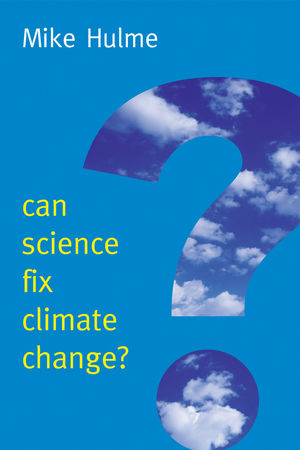
Can science fix climate change? A case against climate engineering
Mike Hulme
Polity, 2014
More information is available here.
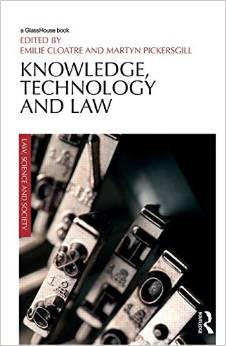
Knowledge, Technology and Law (Law, Science and Society)
Emile Cloatre and Martyn Pickersgill (Eds.)
Routledge, 2015
The relationships between knowledge, technologies, and legal processes are central to the constitution of contemporary societies. This book charts the important interface between studies of law, science and society, as explored from the perspectives of socio-legal studies and the increasingly influential field of science and technology studies. It brings together scholars from both areas to interrogate the joint roles of law and science in the construction and stabilization of socio-technical networks, objects, and standards, as well as their place in the production of contemporary social realities and subjectivities.

Counting Civilian Casualties: An Introduction to Recording and Estimating Nonmilitary Deaths in Conflict
Taylor B. Seybolt, Jay D. Aronson, and Baruch Fischhoff (Eds.)
Oxford University Press, 2013
More information is available here.

Imagined Democracies: Necessary Political Fictions
Yaron Ezrahi
Cambridge University Press, 2012
More information is available here.

Secrecy and Science: A Historical Sociology of Biological and Chemical Warfare
Brian Balmer
Ashgate Publishing, March 2012
More information is available here.

Instituting Nature: Authority, Expertise, and Power in Mexican Rainforests
Andrew S. Mathews
MIT Press, 2011
Greater knowledge and transparency are often promoted as the keys to solving a wide array of governance problems. In Instituting Nature, Andrew Mathews describes Mexico's efforts over the past hundred years to manage its forests through forestry science and biodiversity conservation. He shows that transparent knowledge was produced not by official declarations or scientists' expertise but by encounters between the relatively weak forestry bureaucracy and the indigenous people who manage and own the pine forests of Mexico.
More information is available here.

GM Food on Trial: Testing European Democracy
Les Levidrow and Susan Carr
Routledge, 2010
More information is available here.

Das Klimaexperiment und der IPCC: Schnittstellen zwischen Wissenschaft und Politik in den internationalen Beziehungen
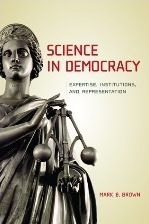
Science in Democracy: Expertise, Institutions, and Representation
Mark B. Brown
MIT Press, 2009
Public controversies over issues ranging from global warming to biotechnology have politicized scientific expertise and research. Some respond with calls for restoring a golden age of value-free science. More promising efforts seek to democratize science. But what does that mean? Can it go beyond the typical focus on public participation? How does the politics of science challenge prevailing views of democracy? In Science in Democracy, Mark Brown draws on science and technology studies, democratic theory, and the history of political thought to show why an adequate response to politicized science depends on rethinking both science and democracy.
More information is available here.

Forest Guardians, Forest Destroyers: The Politics of Environmental Knowledge in Northern Thailand
Tim Forsyth and Andrew Walker
University of Washington Press, 2008In this far-reaching examination of environmental problems and politics in northern Thailand, Tim Forsyth and Andrew Walker analyze deforestation, water supply, soil erosion, use of agrochemicals, and biodiversity in order to challenge popularly held notions of environmental crisis. They argue that such crises have been used to support political objectives of state expansion and control in the uplands. They have also been used to justify the alternative directions advocated by an array of NGOs. They conclude that current explanations fail to address the real causes of environmental problems and unnecessarily restrict the livelihoods of local people.
More information is available here.
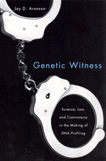
Genetic Witness: Science, Law, and Controversy in the Making of DNA Profiling
Jay D. Aronson
Rutgers University Press, 2007
More information is available here.

Building Genetic Medicine: Breast Cancer, Technology, and the Comparative Politics of Health Care
Shobita Parthasarathy
MIT Press, 2007
More information is available here.
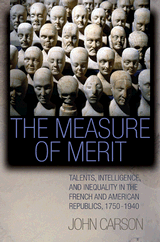
The Measure of Merit: Talents, Intelligence, and Inequality in the French and American Republics, 1750-1940
John Carson
Princeton University Press, 2006
More information is available here.

Pharmacopolitics: Drug Regulation in the United States and Germany
Arthur A. Daemmrich
University of North Carolina Press, 2006
More information is available here.
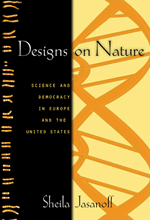
Designs on Nature: Science and Democracy in Europe and the United States
Sheila Jasanoff
Princeton University Press, 2005
More information is available here.
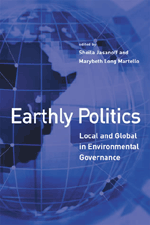
Earthly Politics: Local and Global in Environmental Governance
Sheila Jasanoff and Marybeth Long Martello, eds.
MIT Press, 2004
More information is available here.
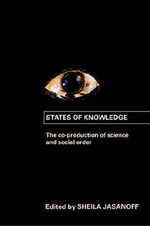
States of Knowledge: The Co-Production of Science and Social Order
Sheila Jasanoff, ed.
Routledge, 2004 (paperback 2006)
More information is available here.
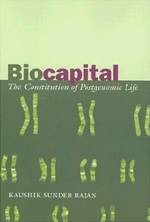
Biocapital: The Constitution of Postgenomic Life
Kaushik Sunder Rajan
Duke University Press, 2006
Biocapital is a major theoretical contribution to science studies and political economy. Grounding his analysis in a multi-sited ethnography of genomic research and drug development marketplaces in the United States and India, Kaushik Sunder Rajan argues that contemporary biotechnologies such as genomics can only be understood in relation to the economic markets within which they emerge. Bringing Marxian theories of value into conversation with Foucaultian notions of biopolitics, he traces how the life sciences came to be significant producers of both economic and epistemic value in the late twentieth century and early twenty-first.
More information is available here.
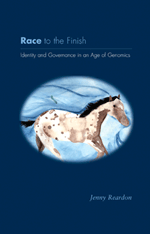
Race to the Finish: Identity and Governance in an Age of Genomics
Jenny Reardon
Princeton University Press, 2004
More information is available here.
If you have a recently published book and would like to feature it on this page, please submit it here.